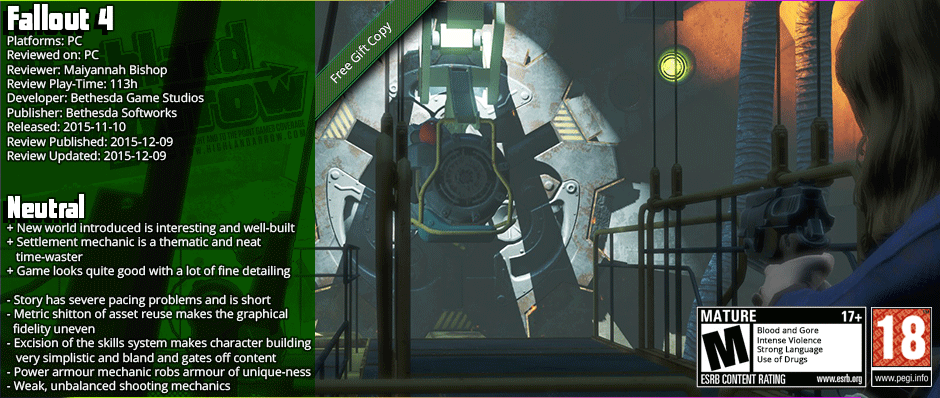

Fallout 4 is the latest installment in the series of post-apocalyptic role-playing games developed by Bethesda Game Studios and published by Bethesda Softworks (confusing, I know!) There was a hype train of epic proportions leading up to the release of the game, with many looking forward to the next entry in the venerable and well-respected Fallout series. Was it worth the hype, and the wait? Well - no, not entirely, but neither is it a bad game. Rather, Fallout 4 is a deeply flawed game, ragged at the edges with the scissor-marks of everything that was cut from previous games, no doubt to make the game all the "safer" to a management board that wanted the game to have a broader appeal. And what we're left with is a game that certainly is quite functional, even has some rare moments of being quite fun, but is in general just tepid, an experience that I would call a good time-waster, something mindless and not all that deep or complicated, which I suppose made it great for the narcotic-painkiller-induced haze that has been the days following my recent amputation, but nonetheless, is not the godly gift to all of the games industry that many expected, and some critics have claimed it is, no doubt with their three-hour play-times barely scratching the surface of the game. Fallout 4 is a game as characterised by what it has cut out of the existing formula as much as what is there.
I Don't Want to Set The World On Fire
After a brief moment of character creation to set your character up, the game promptly drops you into a pre-apocalyptic life, in a somewhat welcome change from pace actually, giving you a brief few moments to glimpse curiously at that indulgent alt-50s/60s pop-sci-fi world before the bombs drop. This is where the game flexes some of its more expensive additions early on, such as how the Mister Handy your family owns will actually call you by the name you chose if its one out of a list of admittedly a rather staggering amount, and the animations that are present when the Vault-Tec salesman comes by to register you. The problem of course with the latter, is it almost immediately shows how rough that addition is - animations jerk and glitch often between frames, and while this actually gets much better later in the game, presumably when they're not rushing through the prologue. And that's the first big problem the game had - it sets up a sort of grieving spouse scenario (husband or wife as appropriate to your choice), as within 10 minutes of the game starting and you getting a brief glimpse of the pre-world neighborhood, the bomb's dropping and you have to run to the Vault you just got signed up for. It has no sense of pacing - something that remains throughout this game - you have no chance to make any sort of a bond with your son or husband/wife, so when the game sticks you in cyro-sleep then wakes you up to your spouses death and child's theft from their arms, it has pretty much no impact to me, because I don't even really know these people. I've seen a handful, maybe two handfuls, of their life. That's it. And after that rushed, probably supposed to be thrilling beginning, it comes to a sudden stop as you're left stumbling bleary-eyed and with little explanation into the vault. I've heard of peaks and troughs but hell, that was a sudden stop into a brick wall, as far as pacing goes.
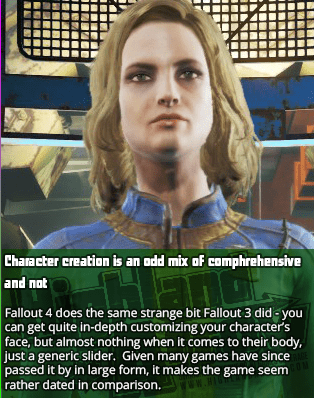
Pacing issues aside, the story that the game offers you is uneven in many ways. While the traditional CRPG forebears 1 and 2 have always had a very strong story and direction to it, 3's while I actually rather enjoyed it (something of a dissenting opinion it seems), felt more like a framing device to the sandbox, which is what Bethesda's big add was. With Obsidian outdoing them in pretty much every story category (except perhaps "being a Fallout story") with the subsequent New Vegas, many were hopeful that Fallout 4 would bring something more to the game - but it doesn't. You're thrown into a sort of multi-sided conflict to which you never have more than a few faces as point of reference for the side, to which none of their issues personally involve you or give you any reason besides, you know, wanting something to do in this game, to get involved in. As if to emphasize the lack of representation of any one side in Fallout 4 is the system from Fallout 3 and New Vegas where you gained reputations with the various groups in the wastelands, you now just get individual reputation with different companions - basically one for each faction and a couple independent ones - and that represents your standing with basically all of them, not that you'd know, because no one ever really reacts to you in any different fashion unless you make their faction hostile.
The lack of a solid feeling of any real organizations going on is amplified by you basically doing two quests for the Minutemen and becoming Lord Commander or some silly title like that, and if you're starting to get the impression that a lot of that stuff is half-arsed, well it's not even that, really, it's more quarter-assed, and that's if I'm being generous. Where Fallout 3 at least populated its sparse ruin of a wasteland with hand-crafted side-quests, we don't even get that in Fallout 4 for the most part. Rather, what you get instead is a procedurally-generated tie in to the settlement mechanic (I'll get into that mechanic below), whereby you're sent to kill a group of randomly-spawned enemies for a settlement that you're trying to befriend. So the way it works is you go to the settlement, they'll tell you the map marker at which a bunch of stuff has spawned, you'll kill like 5-10 guys, and the settlers will be so indebted to you for taking care of what is in the grand scale of the game's difficulty, a mild threat, that they will pledge their undying loyalty to you after you do so. You don't even have to do a few of them to perhaps build up some sort of trust with the settlement. Just get the one quest, talk to contact, bash some skulls in, talk to them again, and you're done. If you use the power armour you can be done these within five minutes. That a game feels padded is a frequent complaint proffered when it comes to modern games, particularly sandbox games, but it feels a very valid criticism indeed, when my quest log was so frequently filled with 3-5 of those random quests and 1-2 main quests. One could argue that having a mechanic for spawning enemies makes the game world feel more dynamic and alive, and I would concede that to a point certainly, however, there are very, very few spawns outside of those missions, and if you turn them down, that leaves a sparse wasteland indeed once you've started clearing through locations, since a "cleared" location won't spawn any more baddies unless the games quest system decides to toss some in one - something I don't think it's even supposed to do, but it managed to a couple times.
So, what we're left with is a game with a main-story line with more starts and stops than the public transit system where I live that tries to distract you from that fact with exceedingly repetitive, procedurally-generated side missions. There does get to be a bit of an interesting sort of plot later on regarding totally-not-Replicant robots that can appear human, but I can't really give them credit for something the way it's in the game makes clear it was at best "inspired", and it shoves it in your face in such a base manner that I got actually kind of more annoyed with it than anything after a while.
Crazy He Calls Me
If there's any enduring lesson of the trope-heavy and generic, but quite acclaimed and loved Dragon's Age and Mass Effect series by Bioware it's that a game can have a thin, trope-tastic story just fine if the characters are interesting enough, and this is, to me, the big gaping boss-fight-style weak spot of Fallout 4 - with 1 exception in the companions and a few notable other characters, I didn't cotton to any of the characters in any real way. Thankfully, unlike say Inquisition where I wanted to invent a device just to project my fist into the game-world just to punch Sera in her slimy face to shut up her "endearing" potty-mouth, there wasn't any that were particularly bad either (well, okay, Piper is basically Kotaku in video game companion form, but I mostly just pitied her being such a vacuous moron more than anything.)
Perhaps thankfully, the companion system from Fallout 3 is not cut back, but perhaps that's just because there'd be pretty much nothing to cut back. You can now trade inventory a little better with people being able to tell them properly what to equip and such, and order them around by holding E, then pressing E at a context-action you basically have to pray to God decides to come up, and then maybe, if the AI feels like it, it will go to do that thing after about five minutes.
Placing things so firmly in the hands of the companions in the game might not have been a mistake if, such as in Mass Effect 1 and 2, those characters were at least interesting and knew to get out of the way, but I would swear the AI in Fallout 4 is somehow even more thicker than molasses than the Fallout 3 AI was. I ended up soloing through much of the game simply because I could not trust my companions not to run in my line of fire, and the dog companion happily running into trip-mines when you go to disarm them happens so often in the game it's basically become an internet meme. It's very easy to scum the AI into shooting blindly into walls, and more often than not in the settlement built sections, they will have atrocious times path-finding and end up spawning on roofs, staring at walls, or literally just staring ahead at a gap they could get through, but their path-finding AI detects as some utterly-impassible wall. That some quests in the game rely on you fighting alongside NPC companions, this quickly becomes an exercise in frustration.
This became especially vexing when I came across the character Nick Valentine, a prototype "synth" - one of the not-replicants I mentioned - whom has this sort of old noir detective vibe that anyone who's heard me gush about the old Tex Murphy games would know I absolutely adore. It was almost a but unfair and certainly unexpected in retrospect - the game had up to that point paraded boring, tired tropes, and I suppose finally found the one which appealed to me and just nailed it, and here I am wanting to keep him around, develop the character, prod him for what passes for story and character development in the game, and he keeps running in front of my lazers and grenades and I just wanted to take him by the shoulders and shake him and yell, "these aren't sound survival tactics, mate!" Nonetheless, he was a charming character all the same, and sort of a glimpse of the tongue-in-cheek black humour the original two games were well-known for, so certainly a strong spot in the game. And he was just as annoying as the others in combat and that got to some real frustration points.
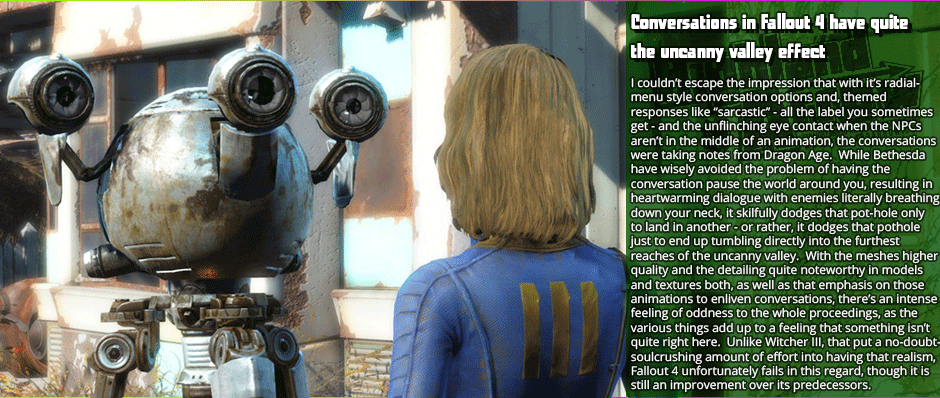
Way Back Home
As with just about any RPG, especially Bethesda ones, inventory management is a pain. Ironically, where before the original games had the more traditional inventory system with graphics that at least made it a bit easier to quickly sort through, 3 that followed just reduced it to a series of categorized lists, and Fallout 4 hasn't done anything to improve on that, so in short, Fallout 4 continues Bethesda's standing trend of inventory systems that are somehow worse and harder to use than games made in the late 90s. You'd perhaps think that given the several years of development time from Fallout 2 in 1998 and our future space year of 2015, we'd have found a better inventory system, but if you did, you would have thought wrong, Commander Excellent.
Of course, and this is the one aspect that the game adds I did find myself sinking a lot of time into, you can stash whatever you like in the initial settlement, Sanctuary Homes, the bombed out picket fences of your former home, and any containers you build therein, and it's here where we get into one of the main selling points of the game - the settlement building aspect.
You know, I have to give it to Bethesda here - while much of the game content has had me squeaking like a bad fan belt pulley on that engine you told yourself you'd get fixed two years ago about all that has been cut or changed in this entry to the Fallout series, this is very, very much a solid and thematic addition ... in theory at least. Where I start complaining again comes more in the fine details, but I do have to commend them - there's this real sort of builder-game, zen-like appeal to it in that same sort of way of building with the sims, and the items available do a really good job of making towns look like post-apocalyptic, hobbled-together-from-scrap affairs.
Where it falls apart is in the actual implementation. While I did eventually acclimatize to the clunky controls (the keybindings for which required me to get radiated and grow a third hand), they remained a constant irritation, in particular how the game likes to snap things together to "help" making corners particularly difficult. Protip: Build the first wall of one of the corners of a room, then the roof, and use how it snaps to the roof on the other side, it'll work around the snapping issue - mostly. It's still tremendously fiddly and I found myself having to constantly adjust and re-adjust to make things work well. Its particularly problematic if you try to build vertically, as making additional floors is a real pain. Another big issue for many, albeit one that no doubt will be inevitably fixed by DLC and mods, is a lack of variety in items to build with. There's a handful of generic building blocks and as many decorations but that's about it. You can unlock a fair bit more by finding certain magazines in the game world, and that does help, but the selection is still very thin.
Also, if you'll cast your mind back 6 paragraphs or so you will recall me mentioning that the AI is tremendously bad, and nowhere is this more apparent in the sort of roles system that the settlement has. Now, it makes good sense in the mechanical design sense - your town needs food, water, power, beds, and security, basic resources and keeping things secure and the like, but the problem becomes in managing it. Given no assigned task they will choose something at their leisure - usually but not always growing crops you've placed, and it comes down to management - with a settlement of any size it rapidly becomes very difficult to keep all those settlers on different tasks. The biggest thing here is there's no easy way to know whose doing what other than watching them, which is harder than you'd think, and whose bed is whose. I had one point I got quite frustrated and put off the settlement system because Sanctuary was bleeding happiness - and I didn't know why until about minutes of faffing about trying to figure out what was going on, until a random settler barked at me that the bed situation was out of hand. So that in hand I had to go through each and every settler and assign them to a bed to make sure I got them all, since there's no indication if an individual settler did (and if there is, I certainly missed it), and it turned out a settler that was doing a caravan supply run to another town was the one not assigned a bed, so I couldn't even resolve the problem until the person came back. Talk about frustrating. And a hell of an oversight in the design.
Those gripes aside, I did find myself rather losing a lot of time into the settlement mechanic, but it feels like a lesser version of that one mod in it's predecessor that let you build stuff, and I find it kind of amusing that a mod did this better, though perhaps not really unexpected of Bethesda these days. But it's fun and definitely the aspect of the game I enjoyed the most, however much I just whinged myself inside out about it. Moreover, its stuff that seems fairly easy to me, to fix, either with a patch or a mod.
Rhythm for You
As I wandered across the radiated, desolate wasteland of Fallout 4 I found myself noticing another absence - a good radio. Say what you will about Fallout 3 and god knows many people have, Threedog and the Galaxy News Radio were something of a fixture and a solid strong point of the game for me, because it combined background music and in-game news, and it did that in such a way it wasn't intrusive and did a good job of relaying status updates of your place in the game, stuff happening in the wasteland, and so on. It took a normally sort of background mechanic in a game someone doesn't give much thought to into something that became iconic to many people, irrespective of what they thought of Fallout 3, and New Vegas continued a tradition of thematic music such as the inclusion of Marty Robbin's big iron to reinforce the western theme.
There's a few problems with the radio music in Fallout 4, but it basically comes down to the fact that it lacks that certain je ne sais quoi of the tie-in to the theme that Fallout 3 and New Vegas both did well. It was basically a way to theme the game that was, in and of itself, something that tied into the theme, and while Fallout 4's Diamond City Radio certainly has a lot more music to it than the previous offerings (perhaps to make up for all those mechanics that were crowbarred out of the game!), it lacks any real central theme and more plays like a YouTube playlist of vaguely Fallout-thematic stuff. New Vegas' western tunes all reinforced that theme it had, but here we don't really get it.
If you didn't catch it from the name, the big central landmark in the landscape of Fallout 4 is Diamond City, which continues the "Nu-Fallout" tradition of places that are built up around old world landmarks, this time with a baseball diamond, hence "Diamond City" So what I would have expected perhaps was some baseball stuff, we are the winners, and all that sort of rot, but we don't really get that, just a sort of scattershot volley of random songs.
Now to be fair to Fallout 4, that wouldn't necessarily be a negative thing - these are all pretty good songs, they just lack that central theming we had before, and eh, that's not the hugest deal in the world. What does become a problem is the announcer. I am going to give Bethesda the benefit of the doubt here and assume that he's meant to be annoying, as certainly seems to be the case, but the point I'd give them for that is immediately taken back away again when I remind them that intentionally annoying, is still annoying. I can't say that it was like, game-breakingly annoying of course, that would be just ludicrous, but I can sum it up quite aptly with the simple fact that as soon as I got to a point where it was a thing, I tuned the game to the Minuteman Radio with it's hourly repetitive "all clear" announcements and elevator music, by virtue of the fact that it was preferable to me when the alternative was only elevator music on the Classical Radio station, or listing to that bloody tosspot on Diamond City Radio some more. It's ironic but perhaps not unexpected at this point that even when the game is adding to the formula, by having many more songs for the radio than its predecessors did, that it still in some way ends up being a step back.
Mighty Mighty Man
One of the headlining items in the promotional material of Fallout 4 was the new system for power armour. Now, rather than it just being the sort of endgame armour, its more of a vehicle, with interchangeable power armour limb piece parts. Essentially you have a very, very good armour, with a full heads-up display, great resistances, additional carry capacity, and greater strength, so the question becomes, how to you balance that? Well, in its predecessors, it was rare, expensive to repair, and at the point of the game where you get it you're facing enemies of the likes that necessitate you needing it.
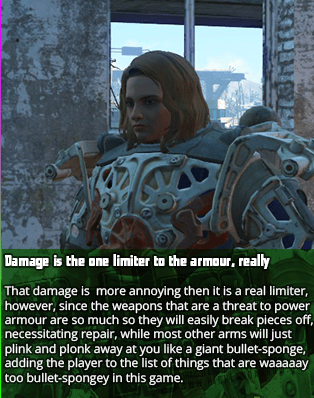
Fallout 4, however, gives it to you almost immediately, no more than an hour into the game in one of the very first big story segments you get after you get your bearings outside of the Vault. This is, to my mind, a huge mistake. First of all, power armour hasn't stopped being as strong as it has, and indeed, with the new mod system (which I'll get into below), its arguably even stronger than in past games, so it's a huge balance issue. There's not much other than a lack of fusion cores, which fuel the suit and are slowly consumed, to stop you from just completely rolling over even the otherwise difficult enemies until you're well into the early 20s in terms of level, and that was at least a good 30 hours of play before I started having any challenge. This also skews the game balance in another way - the developers knew this, evidently, and so you have enemies like a Super Mutant Suicider, and more generally guys with rocket launchers, for instance that are devestating, and there's basically no way to survive those weapons if they hit you outside of power armour. None. You'll be done in even when you do get to the synth armour, which is the end-game armour outside of power armour parts essentially. So unless you enjoy watching the various bits of gore that used to be your character ragdoll gaily across the screen as the game's combat programmer dances on your grave, you'll want to bring the power armour with you.
It's also worth noting that with how the game limits the player's access - or rather use - of power armour with the consumable fusion cores, this is a sort of artificial difficulty placed on the player, as power-armoured enemies can fight you indefinitely without having to worry about fusion cells, so while if you've been over-extending and can get screwed by running out of power, they can't. It's never a great feeling to lose a fight because the enemy feels like they have an unfair advantage, but you can take some solace in the fact that the game basically throws you enough fusion cores to have some sort of post-apocalyptic fusion core keg party.
I had a bigger problem here, though, really - it feels lazy, and it takes a lot of the "special" factor from the armour in the game, well, all of it, I'd argue. Whereas before the power armour was iconic and notable because it was relatively difficult to come by, save by killing someone already in a suit - itself a difficult proposition since its good armour! - you get it early and often in Fallout 4. At time of writing, I can scroll down my steam activity feed and find no less than 6 images of people who made sheds of power armour crafting bench things, each with their own suit of armour, and having 10 or 20 and in many cases, more, of that suit of armour. No matter how good or special an item is the first time you get it in a game, it loses value in the overall game economy when by the end of it, you're basically drowning in them.
Butcher Pete
Combat in general in Fallout 4 is basically the very same shooting from Fallout 3 without any real change. It still feels very weightless, lacking in impact, and floaty shooting, in general, and the melee is what melee always is in most first-person shooters, you wave yourself around while running around trying to dodge and hope for the best, because there's absolutely no technique at all to it. Shadow Warrior this game ain't.
Obviously, this is why the game retains the throwback to it's turn-based ancestors in the VATS targeting system remains. Allowing you to target shots up to a certain amount of "action points" almost instantaneously (it slows down - but doesn't stop - the game while you do) allows for more precise shooting, provided the random number generator is pleased with you upon that day, which it usually won't. Granted, and this is likely why it still exists - the critical hit shots on enemies (and as well, on you!) do have impact, but then you almost go all the way into the other end of the spectrum. With how easy whole arms, legs, and gruesome gibs of flesh slough off enemies there's no sense that it's difficult at all or that the flesh is resisting - save for how bullet-spongey they are when you aren't using that VATS system. Additionally, I would say it feels rather out of place in a game that is otherwise happening in real-time and simulating a world accordingly, and in a game with a lot of shooting in it, it also seems a bit whack to have the shooting mechanics not based upon player skill but rather upon the roll of a dice. The shooting ends up being challenging one when the random number generator decides today is just not your day.
I almost end on the combat feeling I haven't said too much, because really there isn't too much to say here - everything from the guns, to the enemy variety, to how it works is basically the same. The one difference - which wasn't one for me, because I avoided VATS for the most part - was the addition of a mechanic for the critical hits, where with each hit you add a certain random amount to a critical hit meter, and when it's maxed out, you can automatically critically hit your target. No doubt this is added to combat the claim that VATS lives and dies on the random number generator, but it deflects that criticism poorly if at all, since only hits add to it, and they add a somewhat-random amount, so you're still living and dying on the random number generator with VATS, just in a somewhat different way than you would have before. Of course critical misses are still out, as they have been in all "Nu-Fallout" games, as having a level playing field is just not really something Bethesda wanted in the game, evidently.
Anything Goes
The other big add to Fallout 4 is the modification system, which is basically the same rigmarole we are familiar with from many shooter games - you can customise several portions of a firearm or melee weapon to offer various advantages and not. This basically gives you a reason other than selling things off to hold onto all that scrap and stuff, because the only breakable thing now is your power armour - you never have to worry about a gun jamming or breaking again! Gee, it sure does give me the full, post-apocalytpic experience that my gun constructed out of a bit of old pipe and held together by my hopes and prayers will shoot over a thousand rounds into that one enemy with power armour reliably and never fails. Must be made out of unobtanium or something.
That aside, essentially repair has been replaced as the "crafty skill" into making modifications for the guns, and I do have to give it to Bethesda, it's fairly decent, if a bit shallow and copy-paste in terms of mechanical effects. I did appreciate the look and work of each modification giving the gun a different appearance, which breaks up the monotony of seeing the same-looking guns over and over, so it was an improvement in that sense, definitely.
So, the sharper of my readers will have noticed by now that the positives that I do have for the game seem to be to at least some degree offset by negatives, and no more is it true in the mods system. Fallout 4's most disruptive change to the formula is the complete excision of skills from the equation. You no longer have varying levels of skill with different categories (small guns, energy weapons, melee, computers, lockpicking, etc). Rather what you have instead is just the perk system. Its a little more generous now, but not generous enough given the game's dependence on it. Whereas previously by level 20 or 30 you had all of your basic survival skills down at the very least, to one degree or another, you can very much be missing them in Fallout 4 still. This is due to the games relegating "skill levels" to having "levels" of a perk or not. For example, now you cannot try to pick a very difficult lock, and just have it be, well, very difficult - you either have a perk level high enough to allow you to do so, or you cannot even make the attempt. The end result is whole swathes of game content end up walled off because you don't have the appropriate perk points, and there are nowhere near enough perk points coming to you to be able to handle the way this does so.
As you might imagine I'm going to say by now, most of the modifications of the game are locked behind crafting-centric perks - there's a handful of them - and you need to get them to craft all but the basic modifications, which essentially punishes you for wanting to get into the modification-crafting system because you're starving other necessary abilities like, yknow, combat and such, to be able to participate, and the end result of that, is that I ended up just not bothering with modifications much at all. So in short, since you get quickly inundated with a variety of guns all with modifications at significantly less cost (just some bullets or energy cells/etc), it's a system that becomes mostly-vestigal in nature that punishes you too much for pursuing it.
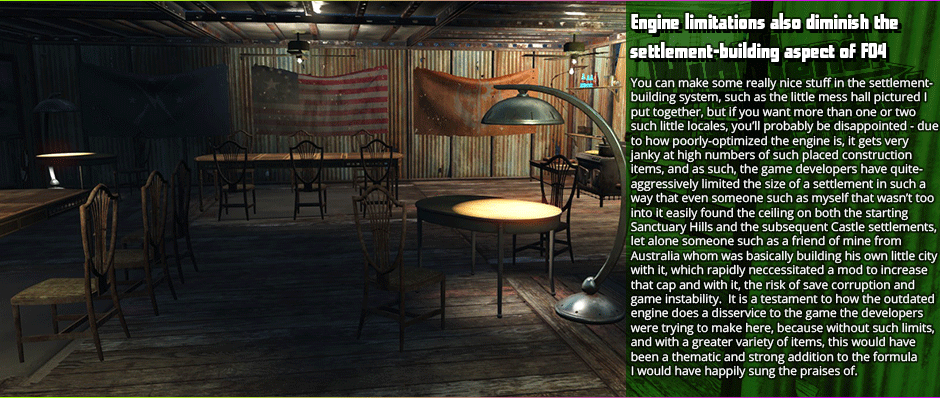
Into Each Life Some Rain Must Fall
So let's address the elephant in the room here, or well, the last of the herd anyways - Fallout 4 is built on the same engine as Fallout 3, to the point many ingame items from Fallout 3 that never appear in Fallout 4 or have any reason to exist in the game, and it suffers for it. So while sure, they can claim a slim moral victory by saying "hey we made a game that works on release", it's only because they are using the previous engine. And the way the game rabidly recycles some assets from Fallout 3 and others from Skyrim frankly comes off insulting at one point with how blatant it is - especially since, quality-wise, they stand out quite a bit from the truly-new stuff.
What gets me here though is that you'd think, given four years with this engine from that venerable first release, as well as the improvements and such from Skyrim, they'd have the thing nailed down completely by now, but nope - while it does, thankfully, actually run this time, it's got all manner of familiar jankiness and bugs. I had consistent problems with rain making the game not render textures at all and reducing the game to a big mess of haze, and lets not even get started on the hour of play time that was digging into the configuration files to actually make the game run at the monitor's native resolution, and the fact that there's still no ingame graphical options menu. There's no excuse for it at this point, they've had years and years to fix this stuff, and with a development cycle literally a quarter of that length Electronic Arts' various outfits regularly improve their engines much more. It ran like ass until I spent two hours of my life fiddling with it, and for an 80$ game that's completely unacceptable. I hardly have some fossil of a computer either, and with the "performance satisfaction" index on Enhanced Steam for the game sitting at an average of 63% at time of writing, I'd wager many others had similar issues. Perhaps it'll get fixed in patches, but for what this game costs and the amount of time they had to fix this stuff, they'll win no gold stars for it.
A plethora of small but also annoying bugs abound: the power armour HUD often doesn't update properly and so ammo and fusion core displays are oft incorrect. Physics are tied to the framerate, it would seem, as well, because if you get really low framerates or really high ones, you get some really ridiculous stuff, including one time an enemy spawned somewhat off the ground at just the right angle that the physics collection rocketed them off into the sky at escape velocity. Godspeed, feral ghoul, you'll be flying with your long-lost brothers from the Capital Wasteland in no time. All kinds of little niggling things like that abound, until you're wearing all those bugs on your bonce like a jaunty fez, and while some people will no doubt say this is expected of Bethesda, there's absolutely no reason why this should be the case.
Accessibility Notes
- No in-game graphics options really beyond HUD customizations; effects, resolution, etc all must be done through launcher, making tweaking onerous.
- Many native resolutions not detected by the game launcher, necessitating manually editing configuration files.
- Subtitles available in game, but if you are doing something in the game at the moment such as a crafting station they do not appear and therefore can be easily missed.
- Ash piles from energy weapons are now very difficult to spot.
- The rythmic slight swaying of the power armour HUD is something I can see doing in people susceptible to simulation sickness.
 " title=" " class="review-footer" />
" title=" " class="review-footer" />

